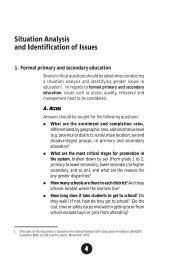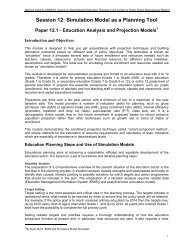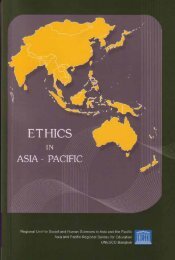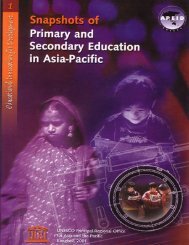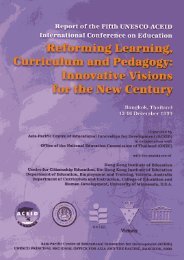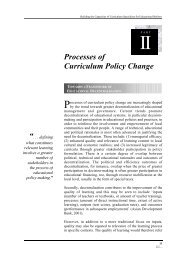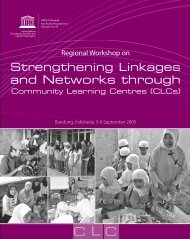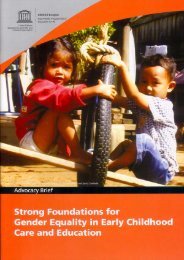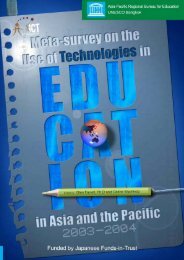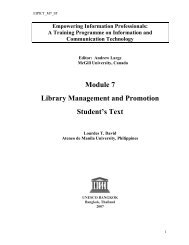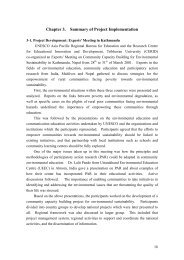Statistics on Cultural Industries - International Trade Centre
Statistics on Cultural Industries - International Trade Centre
Statistics on Cultural Industries - International Trade Centre
- No tags were found...
You also want an ePaper? Increase the reach of your titles
YUMPU automatically turns print PDFs into web optimized ePapers that Google loves.
holistic approach to development as echoed in the increasing support for c<strong>on</strong>cepts such as the“human development index”, “liveable societies”, or “gross nati<strong>on</strong>al happiness”.The approach was further boosted with the adopti<strong>on</strong> of the Universal Declarati<strong>on</strong> <strong>on</strong> <strong>Cultural</strong> Diversity:“The reducti<strong>on</strong> of cultural diversity, whether by accident or by cultural design, is a direct hazardto the building of the capacity to aspire, without which development projects can never succeed.This is the key argument for the indivisibility of culture and development, as interlinked projects forthe advancement of democracy and equity <strong>on</strong> a global basis. … Development processes whichare not founded up<strong>on</strong> local knowledge and ‘ways of being’ counteract sustainability by relying <strong>on</strong>external models and methods which may be inappropriate to the local cultural landscape”. The adopti<strong>on</strong> of the Jodhpur C<strong>on</strong>sensus emphasized, however, the Asia-Pacific regi<strong>on</strong>’s strategicrepositi<strong>on</strong>ing of cultural industries to become a fundamental driver for local socio-ec<strong>on</strong>omic growthand a key to the installati<strong>on</strong> of more sustainable models for social development in the regi<strong>on</strong>. Torealize this visi<strong>on</strong>ary strategy, UNESCO and its UN partner agencies are committed to assist thosecountries that would like to pilot activities under the framework of the Jodhpur Initiatives. Bhutanwas am<strong>on</strong>g the very first countries to indicate an interest in pursuing the strategy outlined in theJodhpur Initiatives, both at nati<strong>on</strong>al level and as far as possible as part of sub-regi<strong>on</strong>al trade andec<strong>on</strong>omic co-operati<strong>on</strong>.To support the realizati<strong>on</strong> of this visi<strong>on</strong>, Bhutan hosted the BIMSTEC First Ministerial Meeting <strong>on</strong>Culture in Paro in May 2006. The meeting brought together the Ministers of Culture from sevencountries - Bangladesh, Bhutan, India, Myanmar, Nepal, Sri Lanka, and Thailand – to discuss the kindof cultural programming that should be part of the technical co-operati<strong>on</strong> and trade agreement.The Paro Initiative adopted by the meeting is a roadmap for socio-ec<strong>on</strong>omic progress driven bycultural industries in the BIMSTEC regi<strong>on</strong>. The first modality of co-operati<strong>on</strong> agreed up<strong>on</strong> in theParo Initiative is a commitment to co-ordinated nati<strong>on</strong>al data collecti<strong>on</strong> for the establishment ofbaseline data related to the cultural industries sector in each country. The Paro Initiative also callsfor the establishment of a BIMSTEC <strong>Cultural</strong> <strong>Industries</strong> Observatory (CIO) to be located in Bhutan,and a BIMSTEC <strong>Cultural</strong> <strong>Industries</strong> Commissi<strong>on</strong> (CIC).Like most of the countries in Asia, Bhutan has yet to actively plan and invest for the opportunitiesposed by the wide-reaching structural changes to ec<strong>on</strong>omy and trade, especially as it c<strong>on</strong>cernsthe c<strong>on</strong>sequences for local development. By co-operating to strengthen cultural diversity andartistic strength through trade and technical co-operati<strong>on</strong>, for example in the c<strong>on</strong>text of BIMSTECas stipulated in the Paro Initiative, Bhutan has a great opportunity to pursue the applicati<strong>on</strong> ofa more sustainable, holistic development model and to positi<strong>on</strong> itself in relati<strong>on</strong> to the globalmarket for cultural goods and services.. “The Universal Declarati<strong>on</strong> <strong>on</strong> <strong>Cultural</strong> Diversity”, adopted by the United Nati<strong>on</strong>s, 2002.. See http://www.unescobkk.org/culture/cultural_industries.. Bay of Bengal Initiative for Multisectoral Technical and Ec<strong>on</strong>omic Cooperati<strong>on</strong>65



